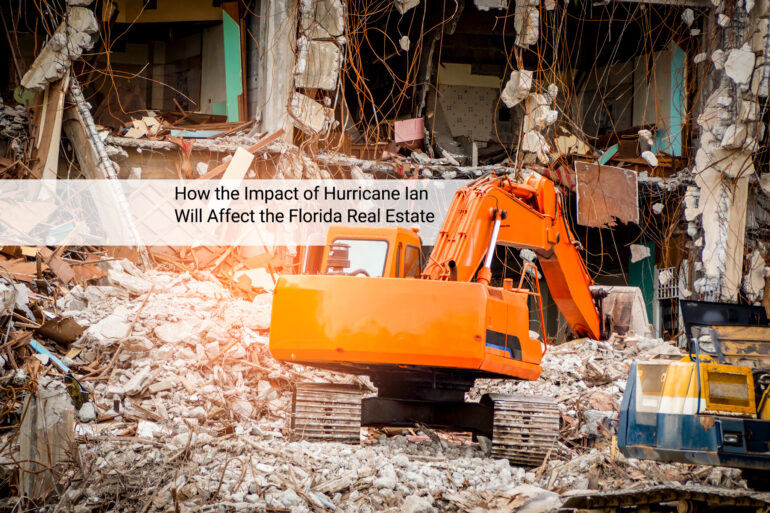How Hurricane Ian Will Affect Florida Real Estate
Though the news cycle for Hurricane Ian has largely subsided, the damage it caused has not.
The hurricane hit Southwest Florida (just south of Tampa) on September 28 with wind speeds of up to 150 miles per hour. It was just shy of category four status and tied the record for the strongest hurricane in Florida since Michael in 2018.
According to modeling firm RMS, the storm likely caused insured losses of $67 billion, which Axios reports would make Hurricane Ian the costliest storm in Florida history and second nationally when adjusted for inflation.
So, what does this mean for the Florida real estate market? Read on to find out!
Housing activity usually declines significantly in the months immediately following a hurricane but rebounds to pre-storm levels within three to four months.
History of Florida Hurricanes and Home Prices
Though hurricanes have always been a threat in Florida, this hasn’t deterred people from living there or moving in from out of state. In fact, the state’s population has skyrocketed in recent years. It went from 18.8 million in 2010 to over 21.7 million in 2021, a change of 15.6% (for comparison, the overall US population grew by 7.3% during the same time period).
There are many reasons for this: the state’s warm weather and sunny beaches, low cost of living, zero individual income tax, and large retiree and immigrant communities (to name a few). So, what happens immediately after a hurricane devastates the state?
According to a 2006 case study on the impact of hurricanes on housing economic activity produced by the National Association of Realtors (NAR), housing activity usually declines significantly in the months immediately following a hurricane but rebounds to pre-storm levels within three to four months.
A more recent 2021 study by property valuation and collateral risk management company Veros showed the impact of hurricanes on home price appreciation. It took the top five Florida real estate markets affected by category four or five storms in the last thirty-two years and then analyzed home appreciation in the years before and after the hurricane. The results might surprise you! All these markets experienced higher levels of home appreciation the year after the storm than the year before. After controlling for potential non-hurricane housing factors, the post-hurricane annual home appreciation in these markets ranged from a low of 2.4% to 11.9% for an average boost of 6.6%. In other words, home appreciation tends to accelerate after a hurricane.
It’s too early to tell if Hurricane Ian will change this trend.
Why is that? Simple, it’s supply and demand. For one, the property damage caused by a hurricane lowers the housing inventory. The less supply, the higher prices go. At the same time, those whose homes were damaged or destroyed need to find new places to live, which creates a temporary increase in housing demand. The more demand, the higher prices go. The combined impact of low supply and high demand lead to home values appreciating.
How Will Hurricane Ian Impact the Florida Real Estate Market?
That said, past housing performance isn’t a guarantee of future results. To understand how Hurricane Ian will impact the Florida real estate market, we need to examine it in more detail.
Before Hurricane Ian, Florida’s housing market was already on fire. Housing prices reached record levels due to a combination of construction labor and supply shortages, high interest (and mortgage) rates, and rising inflation (among other things). In fact, in March 2022, Tampa, FL (where Hurricane Ian hit hardest), logged the highest year-over-year home price increase of the country’s largest metro areas at 32.5%!
So, will Florida housing prices continue to go up? It’s impossible to say for sure, but so far, they have been. According to Zillow’s market overview, the median Florida home value was still at a record of $405,489 in August. It’s too early to tell if Hurricane Ian will change this trend. It might cause a temporary drop in housing demand as fewer people want to move into the state for fear of future hurricanes. However, people are quick to forget storms due to recency bias, so even if move-ins slow down, it won’t last long. After all, this isn’t Florida’s first hurricane, unfortunately.
Many homeowners will be motivated to sell below market value just to get rid of their property, so they can move. If you have the knowledge and skill to repair a broken home, you could make a lot of money.
One thing’s for sure: Hurricane Ian will make homeowners and flood insurance premiums go up. According to the Insurance Information Institute, the annual cost of an average Florida homeowner’s insurance policy in 2022 was already $4,231, which is nearly three times more than the US annual average. With the number of insurance claims that will be filed in the wake of Hurricane Ian, rates will jump even more, making homeownership more expensive.
In fact, some areas in Florida may see home and flood insurance become less available. Even before Hurricane Ian, six homeowners’ property insurers reached insolvency in 2022, which is the most since 1992 when Hurricane Andrew pushed many insurers out of state. This factor could become a turn-off to homebuyers and investors not willing to take the risk of a storm wiping out their assets.
Ultimately, the rising cost (and sometimes unavailability) of home and flood insurance in hurricane-prone parts of Florida may lead to a drop in housing demand. Given how Florida home values tend to appreciate after hurricanes, it’s unclear whether a drop in housing demand will be enough to have a major impact on the state’s hot market.
The Future of Florida Real Estate Investing
Whatever happens, Florida real estate investors need to take climate change into account when choosing properties to buy. The increasing number and intensity of hurricanes (not to mention rising heat) in parts of Florida (and the attendant rise in home and flood insurance costs) may dampen the demand for housing there. That doesn’t mean you can’t turn a profit in these areas. It just means that if you’re not careful, you could end up selling your property at a loss and lose money on your investment.
Alternatively, the damage caused by Hurricane Ian will lead to a spike in distressed properties for sale. This can be a huge opportunity for fix-and-flippers. Many homeowners will be motivated to sell below market value just to get rid of their property, so they can move. If you have the knowledge and skill to repair a broken home, you could make a lot of money. Use PropertyOnion.com’s free property search tool to find your next distressed Florida property today!








